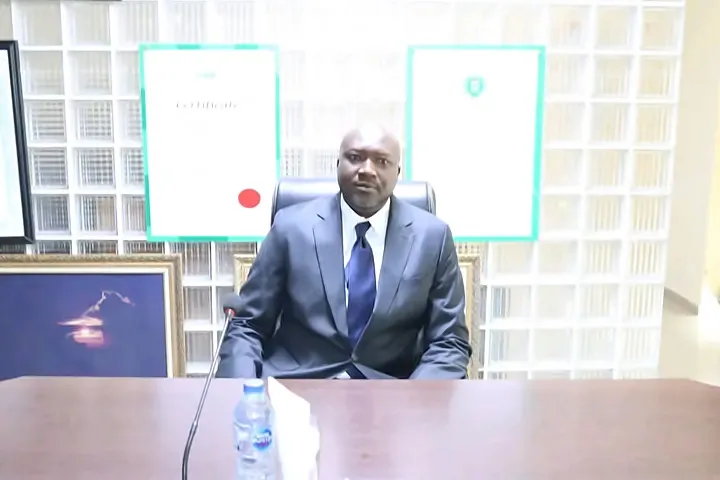General
Nigerians Still Distrust Government—Survey

By Modupe Gbadeyanka
A recent survey has shown that the Nigerian government remains the least trusted with citizens having no confidence in the ability of current leaders to address the country’s challenges successfully.
According to the 2020 Edelman Trust Barometer, four mainstream institutions were looked into in the report and they were government, business, media and non-governmental organisations.
However, Nigerians’ trust in Chief Executive Officers of businesses as positive change agents rose while trust in NGOs and the media also increased according to the supplementary data for Nigeria.
It was observed that while trust across the four mainstream institutions in the country increased compared to 2019, business still led with 91 per cent, followed by NGOs with 87 per cent. The media was the third with 84 per cent while the government only had 55 per cent.
These revelations amongst others were contained in the 20th Edelman Trust Barometer Survey Report unveiled virtually by Edelman and its Exclusive Nigerian Affiliate, Chain Reactions Nigeria in Lagos recently.
The presentation done virtually because of disruptions caused by the coronavirus pandemic saw the Chief Executive Officer of Edelman Africa, Jordan Rittenberry, present the global 2020 Edelman Trust Barometer and the Impact of COVID-19 on Trust reports. A Consultant at Chain Reactions, Adekunle Dixon Odukoya, presented the supplementary data for Nigeria.
An all-female panel drawn from government, media, business and civil society also discussed the survey report and its implications for their respective constituencies and Nigeria at large, in line with the theme, Competence and Ethics.
They were the Special Adviser to President Muhammadu Buhari on Social Protection, Mrs Maryam Uwais; Director, Public Affairs, Lafarge Plc, Folashade Ambrose-Medebem, Director of News, TVC, Stella Din Jacob, and the Convener, Enough is Enough, Yemi Adamolekun. Former Assistant Director of Programmes, Lagos Operations of the Federal Radio Corporation of Nigeria (FRCN), Funke Treasure-Durodola, moderated.
Revealing how public officials can boost their trust among Nigerians, Mrs Uwais said it was vital they bring transparency into their activities and remain consistent.
The former Coordinator of the Social Invest Programmes (SIP) further cited the example of how she addressed the complaints that trailed the Conditional Cash Transfer and School Feeding Programme transparently by engaging Civil Societies to monitor as what public officials can do to earn public trust.
On the proliferation of fake news and its weaponization contributing to mistrust of the media, Din Jacobs, citing the Ibrahim Magu issue, said government officials hoarding information and vested interests is not helping matters. She advised media practitioners to imbibe balance in their reportage as this is what can buy them trust among the public.
On the issue of accountability and transparency, Adamolekun said Nigerians don’t trust the government because it hoards information and refuses to engage with citizens who want to know about its activities.
On what businesses can do to retain the trust of Nigerians, Ambrose-Medebem aligned with earlier speakers that institutions should prioritise full disclosure. She disclosed that transparency is a core value at Lafarge Africa Plc, which is always the first to publish its Sustainability Report.
Commenting on the 2020 Edelman Trust Barometer report, Managing Director/Chief Strategist, Chain Reactions Nigeria, Israel Jaiye Opayemi, noted that since 2017 when the report was first unveiled in Nigeria, major corporate players have always looked forward to its release because they draw significant insight from it to grow the asset of their reputation.
Mr Opayemi, however, warned institutions and corporate Nigeria not to take trust for granted. “Let’s pay attention to the fact that trust itself is mobile. Today, because you are highly trusted as an institution, does not really mean that six or 12 months down the line, it’s still going to remain the same. We all must focus on the asset of trust because it is highly mobile. It changes from time to time.”
The Edelman Trust Barometer is the annual global trust and credibility survey conducted by Edelman Intelligence, the independent research arm of the Edelman global network testing how well people trust those four critical institutions of the society to do what is right. This year’s survey conducted by Edelman Intelligence between October 19 and November 18, 2019, sampled more than 34,000 respondents across 28 countries.
General
NIMASA Rallies Stakeholders’ to Develop National Action Plan

By Adedapo Adesanya
The Nigerian Maritime Administration and Safety Agency (NIMASA) has pledged its commitment to provide the regulatory leadership, technical coordination, and stakeholder engagement required to successfully develop and implement a robust National Action Plan on maritime decarbonization in Nigeria.
The Director General of the agency, Mr Dayo Mobereola, made this known during the National Stakeholders’ workshop on the development of a National Maritime Decarbonization Action Plan, further describing the workshop as a critical step in actualising the Federal Government’s blue economy and climate objectives.
Represented by the Executive Director, Operations, Mr Fatai Taiye Adeyemi, the NIMASA DG underscored the significance of the IMO GreenVoyage2050 Project, a technical cooperation initiative /designed to support developing countries in implementing the IMO GHG Strategy.
According to him, the National Action Plan being developed will reflect national realities, leverage existing capacities, address identified gaps, and align with broader economic and environmental priorities of the federal government.
Mr Mobereola stressed that “this transition is not merely about compliance with international obligations, it is about safeguarding our marine environment, protecting public health, strengthening the blue economy, and ensuring that our maritime industry remains competitive and future-ready”, the DG said.
Also speaking at the event was the Technical Manager of the IMO GreenVoyage2050 Project, Ms Astrid Dispert, who highlighted that the overarching objective of the initiative is to advance a coherent and globally aligned regulatory framework to accelerate maritime decarbonization.
She also emphasised that NIMASA plays a pivotal role in driving the project at the national level.
The IMO GreenVoyage2050 Project provides technical expertise and institutional support to assist countries in developing and implementing National Action Plans that promote sustainable shipping practices, encourage investment in clean technologies, and strengthen capacity for long-term emissions reduction.
Through this collaboration, the federal government is advancing deliberate steps towards maritime decarbonization, reinforcing its commitment to global climate goals and ensuring a cleaner, greener, and more sustainable future for the sector.
General
BPP Mandates Digital Submission for MDAs From March 1

By Adedapo Adesanya
The Bureau of Public Procurement (BPP) has directed all Ministries, Departments and Agencies (MDAs) to comply with its digital submission process effective March 1.
The directive was contained in a circular signed by the Director-General of the Bureau, Mr Adebowale Adedokun, noting that the move was part of the bureau’s commitment to digital transformation and paperless governance.
It explained that the transition followed an earlier circular of Aug. 4, 2025, which introduced electronic submission procedures.
According to the bureau, it has successfully moved from physical filings to a dedicated e-mail service for document submissions and is now advancing to a more robust and integrated system.
The circular announced the inauguration of the BPP Digital Submission Portal, a web-based platform designed to enable MDAs submit procurement-related documents directly to the Bureau.
It stated that the automated platform would streamline the submission process, enhance transparency and ensure accelerated tracking of procurement-related documents and petitions.
“With effect from March 1, all MDAs will be required to use the portal to submit requests for ‘No Objection’ Certificates, approvals for ‘No Objection’ for special procurements, clarifications and status updates on submissions,” the bureau said.
It added that the portal would be hosted on the Bureau’s official website and would become fully operational from the effective date.
The bureau warned that physical submissions or manual hand-deliveries would no longer be prioritised and would eventually be rejected following the full transition to the digital platform.
It urged accounting officers to brief their procurement departments and ICT units on the development to ensure seamless processing of procurement activities from March 1.
It further advised MDAs to contact the Bureau via its official email for information on the onboarding process and integration into the portal.
The bureau emphasised that full compliance by all MDAs was required to ensure a smooth transition and avoid delays in the implementation of the 2026 fiscal year procurement processes.
General
Senate Seeks Removal of CAC Boss Hussaini Magaji

By Adedapo Adesanya
The Senate has asked President Bola Tinubu to remove the Registrar General of the Corporate Affairs Commission (CAC), Mr Hussaini Ishaq Magaji, from office.
The Senate Committee on Finance, while passing a resolution in Abuja on Thursday, accused Mr Magaji, a Senior Advocate of Nigeria (SAN), of failing to honour the Senate’s invitations to account for the finances of his agency.
“He refused on so many occasions to honour our invitation to appear before this committee.
“We have issues with the reconciliation of the revenue of CAC.
“Each time we invite him, he gives us excuses,” the Chairman of the committee, Mr Sani Musa, said as the committee passed the resolution.
CAC was part of a group of agencies that the House of Representatives Public Accounts Committee (PAC) recommended zero allocation for the year 2026, for allegedly failing to account for public funds appropriated to them.
The committee, at an investigative hearing held two weeks ago, accused CAC and some other ministries, departments and agencies (MDAs) of shunning invitations to respond to audit queries contained in the Auditor-General for the Federation’s annual reports for 2020, 2021 and 2022.
The PAC chairman, Mr Bamidele Salam, stated that the National Assembly should not continue to appropriate public funds to institutions that disregard accountability mechanisms, saying this will create fiscal discipline and strengthen transparency across federal institutions and conform with extant financial regulations and the oversight powers of the parliament.
“Public funds are held in trust for the Nigerian people. Any agency that fails to account for previous allocations, refuses to submit audited accounts, or ignores legislative summons cannot, in good conscience, expect fresh budgetary provisions. Accountability is not optional; it is a constitutional obligation,” he said.
-

 Feature/OPED6 years ago
Feature/OPED6 years agoDavos was Different this year
-
Travel/Tourism10 years ago
Lagos Seals Western Lodge Hotel In Ikorodu
-

 Showbiz3 years ago
Showbiz3 years agoEstranged Lover Releases Videos of Empress Njamah Bathing
-

 Banking8 years ago
Banking8 years agoSort Codes of GTBank Branches in Nigeria
-

 Economy3 years ago
Economy3 years agoSubsidy Removal: CNG at N130 Per Litre Cheaper Than Petrol—IPMAN
-

 Banking3 years ago
Banking3 years agoSort Codes of UBA Branches in Nigeria
-

 Banking3 years ago
Banking3 years agoFirst Bank Announces Planned Downtime
-

 Sports3 years ago
Sports3 years agoHighest Paid Nigerian Footballer – How Much Do Nigerian Footballers Earn














